
COLLOQUIUM MATHEMATICUM
Scope & Guideline
Bridging theory and practice in the mathematical community.
Introduction
Aims and Scopes
- Algebra and Representation Theory:
Research in algebra, particularly in representation theory, group theory, and modules, focusing on structures and properties of algebraic systems. - Geometry and Topology:
Studies involving geometric properties of spaces, including Riemannian geometry, manifolds, and topological properties of various mathematical objects. - Functional Analysis and Operator Theory:
Investigations into properties of functional spaces, operators, and their applications, including spectral theory and functional inequalities. - Combinatorics and Discrete Mathematics:
Exploration of combinatorial structures, graph theory, and discrete systems, often with applications to other mathematical fields. - Mathematical Physics:
Research that bridges mathematics and physics, particularly in areas such as differential equations, geometric analysis, and mathematical aspects of physical theories. - Number Theory and Cryptography:
Studies focusing on the properties of integers, number systems, and their applications in cryptographic protocols.
Trending and Emerging
- Noncommutative Algebra and Geometry:
There is a notable increase in research related to noncommutative algebraic structures and their geometric interpretations, highlighting a growing interest in the interplay between algebra and geometry. - Higher-Dimensional Algebra:
Emerging themes in higher-dimensional algebra, including homotopy theory and derived categories, are becoming more prevalent, signaling a trend towards abstract algebraic frameworks. - Mathematical Aspects of Machine Learning:
As mathematics increasingly intersects with computer science, papers exploring the mathematical foundations of machine learning algorithms and their theoretical implications are on the rise. - Topology and Its Applications:
Research focusing on topological methods and their applications in various fields, including data analysis and computational topology, is gaining momentum. - Geometric Analysis and PDEs:
A surge in studies addressing geometric analysis, particularly concerning partial differential equations and their solutions in geometric contexts, points to an expanding interest in this area.
Declining or Waning
- Classical Analysis:
Topics related to classical analysis, such as traditional calculus and real analysis, have seen a reduction in emphasis, possibly due to the increasing focus on more abstract and applied areas of mathematics. - Elementary Number Theory:
The frequency of papers specifically addressing elementary number theory seems to be decreasing, indicating a shift towards more advanced number theoretic concepts and their applications. - Probability Theory:
Research articles on foundational aspects of probability theory are becoming less common, suggesting a trend towards more specialized applications or interdisciplinary approaches. - Deterministic Dynamical Systems:
The exploration of deterministic systems appears to be less frequent, as interest may be shifting towards stochastic processes and their implications. - Classical Geometry:
Traditional topics within the realm of classical geometry, particularly Euclidean geometry, are showing a decline, as research leans more towards differential geometry and geometric analysis.
Similar Journals
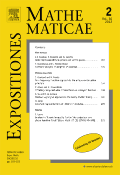
EXPOSITIONES MATHEMATICAE
Exploring Innovative Theories in MathematicsEXPOSITIONES MATHEMATICAE, published by Elsevier GmbH, stands as a significant journal in the realm of mathematics, catering primarily to researchers, professionals, and students. With an ISSN of 0723-0869 and an E-ISSN of 1878-0792, this journal has made its mark in the academic community, boasting a Q2 classification in the miscellaneous mathematics category for 2023, illustrating its prominence within its field. The journal addresses a diverse scope of mathematical topics, encouraging the publication of original research and innovative theories while maintaining rigorous academic standards. As it converges from 2004 to 2024, EXPOSITIONES MATHEMATICAE continues to be an essential resource for advancing mathematical knowledge and fostering scholarly communication, despite being a non-open-access publication. Its location in Munich, Germany further anchors it within a rich intellectual tradition, providing accessibility for the mathematical community worldwide.

Aequationes Mathematicae
Exploring the Depths of Discrete Mathematics and Combinatorics.Aequationes Mathematicae is a distinguished academic journal published by SPRINGER BASEL AG, focusing on the dynamic fields of Applied Mathematics, Discrete Mathematics, and Combinatorics. Since its inception in 1968, the journal has served as a vital platform for disseminating high-quality research, with Converged Years expected to extend to 2024. With an impressive Q2 ranking in multiple mathematical disciplines as of 2023, Aequationes Mathematicae is positioned within the top half of its field, reflecting its reputation for excellence. Spanning the globe from its base in Basel, Switzerland, this journal is ideal for researchers, professionals, and students seeking to advance their knowledge and contribute to ongoing discussions within mathematics. While it does not currently offer Open Access options, readers can still access an extensive archive of impactful studies that bolster its standing within the academic community.

Pure and Applied Mathematics Quarterly
Exploring the Depths of Theoretical and Practical MathematicsPure and Applied Mathematics Quarterly is a prestigious journal published by INT PRESS BOSTON, INC, focusing on the diverse and evolving field of mathematics. Since its inception in 2007, this journal has grown significantly, currently holding a Q1 ranking in the Mathematics (Miscellaneous) category for 2023, positioning it among the leading publications in the discipline. With a commitment to publishing high-quality research, Pure and Applied Mathematics Quarterly fosters innovation and dialogue within the mathematical community by providing a platform for theoretical advancements and practical applications. The journal remains accessible to researchers and professionals through its ISSN 1558-8599 and E-ISSN 1558-8602, although it does not currently offer open access. As a vital resource for mathematicians, educators, and students, this journal endeavors to expand the frontiers of mathematical knowledge and contribute to the academic dialogue surrounding this fundamental science.

JOURNAL OF THE AMERICAN MATHEMATICAL SOCIETY
Transforming Ideas into Mathematical BreakthroughsThe Journal of the American Mathematical Society (ISSN: 0894-0347; E-ISSN: 1088-6834), published by the American Mathematical Society, stands as a pillar in the fields of mathematics and applied mathematics. This prestigious journal, with a remarkable impact factor and ranking in the top tier (*Q1*) within both the Applied Mathematics and general Mathematics categories, is recognized for its contribution to advancing mathematical research and theory. With data reflecting it as the 8th ranked journal in General Mathematics (top 2%) and the 34th in Applied Mathematics (top 6%), the journal consistently showcases groundbreaking studies and innovative methods that greatly influence academia and industry alike. Though not an open-access journal, it offers a wealth of resources and intellectual discourse for researchers, professionals, and students alike. Specializing in comprehensive and theoretical aspects of mathematics, the Journal remains dedicated to publishing articles that promote understanding and propel the field forward, highlighting its significance as an essential tool for those engaged in mathematical research.
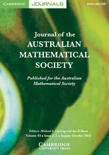
JOURNAL OF THE AUSTRALIAN MATHEMATICAL SOCIETY
Unlocking the potential of mathematics for all.JOURNAL OF THE AUSTRALIAN MATHEMATICAL SOCIETY, published by Cambridge University Press, is a prestigious journal dedicated to advancing research and scholarship in the field of mathematics. With a long-standing history since its inception in 1959, the journal has established itself as a vital resource for mathematicians, researchers, and students worldwide. Operating under an Open Access model, it ensures that high-quality research is accessible to all, enhancing the dissemination of knowledge and fostering collaboration in the mathematical community. The journal holds a commendable Q2 ranking in the 2023 Mathematics (miscellaneous) category and is ranked #145 in Scopus among general mathematics journals, placing it in the 63rd percentile, which reflects its significant influence and reputation in the discipline. The JOURNAL OF THE AUSTRALIAN MATHEMATICAL SOCIETY continues to provide a platform for innovative mathematical research and critical discourse within the field, making it an invaluable asset for professionals and aspiring mathematicians alike.
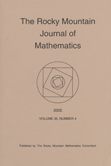
ROCKY MOUNTAIN JOURNAL OF MATHEMATICS
Fostering Collaboration in Diverse Mathematical FieldsROCKY MOUNTAIN JOURNAL OF MATHEMATICS, published by the Rocky Mountain Math Consortium, serves as a critical platform for researchers and practitioners in the field of mathematics since its inception in 1971. With a notable presence in the academic community, this journal covers a broad spectrum of mathematical disciplines, positioning itself in the Q2 category for Mathematics (miscellaneous) as of 2023. Despite being a subscription-based journal, it is recognized for its rigorous peer-review process and contributions to theoretical and applied mathematics, helping to advance knowledge and foster collaboration among mathematicians. The journal's ISSN number is 0035-7596 and its E-ISSN is 1945-3795, reflecting its commitment to accessibility and dissemination of high-quality research. Based in Tempe, Arizona, at Arizona State University, the journal continues to play an important role in shaping contemporary mathematical discourse through well-researched articles and innovative studies, aiming to bridge gaps between various mathematical subfields and engage a diverse audience, including students and established researchers alike.
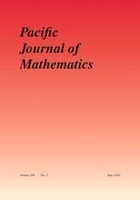
PACIFIC JOURNAL OF MATHEMATICS
Unveiling Innovative Research in the Realm of MathematicsThe PACIFIC JOURNAL OF MATHEMATICS, established in 1951 and published by Mathematical Sciences Publishers, is a premier peer-reviewed journal in the field of mathematics, renowned for its rigorous scholarship and impactful research contributions. With an HIndex that reflects its sustained academic influence, this journal has been categorized within the Q1 quartile in the field of mathematics (miscellaneous) as of 2023, showcasing its position among the top-tier mathematics journals globally. Although the journal operates under a traditional subscription model rather than an Open Access format, it remains dedicated to disseminating original research that spans various domains within mathematics. Researchers, professionals, and students alike will find the journal's breadth of topics and commitment to quality work instrumental in advancing their understanding and exploration of mathematical concepts. This esteemed journal continues to thrive as a vital resource for the mathematical community through its comprehensive collection of articles from a diverse range of mathematical disciplines, thus maintaining a significant role in shaping the future of mathematical inquiry.
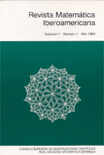
REVISTA MATEMATICA IBEROAMERICANA
Championing high-quality research in mathematics.REVISTA MATEMATICA IBEROAMERICANA, published by the EUROPEAN MATHEMATICAL SOCIETY, is a leading open-access journal dedicated to advancing the field of mathematics. Since its inception in 1996, the journal has provided a platform for high-quality research up to 2024, achieving a prestigious Q1 ranking in the miscellaneous mathematics category and placing it within the top 77th percentile of the Scopus rankings. Based in Spain, this journal fosters a vibrant academic community by disseminating innovative research, theoretical insights, and applications within the broad scope of mathematics. With its commitment to open access established in 2022, REVISTA MATEMATICA IBEROAMERICANA ensures that groundbreaking research is accessible to scholars, practitioners, and students worldwide, emphasizing the importance of collaboration and knowledge sharing in the mathematical sciences. The journal is a vital resource for anyone invested in the evolution of mathematics, providing a rich array of articles that contribute to both the theoretical and applied landscapes of the discipline.

Periodica Mathematica Hungarica
Unveiling the Depths of Mathematical Knowledge.Periodica Mathematica Hungarica is a prestigious academic journal published by Springer, focusing on the field of mathematics, with a particular emphasis on miscellaneous mathematical studies. Established in 1971, this journal has maintained its commitment to advancing mathematical research and its applications, making significant contributions over its converged years through 2024. With a Q2 ranking in the mathematics category as of 2023, it establishes itself as a vital resource within the mathematical community. Researchers and academics will find its inclusion in the Scopus database, ranking #189 out of 399 in general mathematics, indicative of its impact and relevance. Although it does not feature open access, the journal provides a wealth of high-quality peer-reviewed articles, thereby serving as an essential platform for the dissemination of innovative mathematical theories, methodologies, and findings. Engaging with the content of Periodica Mathematica Hungarica is crucial for anyone looking to stay at the forefront of mathematical research and development.

TRANSACTIONS OF THE AMERICAN MATHEMATICAL SOCIETY
Exploring the Depths of Mathematical KnowledgeTRANSACTIONS OF THE AMERICAN MATHEMATICAL SOCIETY, published by the American Mathematical Society, is a premier journal in the field of mathematics that has been contributing to the advancement of mathematical knowledge since 1900. With an ISSN of 0002-9947 and an E-ISSN of 1088-6850, this journal holds a prestigious position in the academic landscape, evidenced by its Q1 rankings in both Applied Mathematics and Miscellaneous Mathematics categories as of 2023. With a Scopus ranking of #97 in General Mathematics and a percentile standing of 75th, the journal is recognized for its rigorous peer-review process and the quality of the research it publishes. Though it does not currently offer open access options, it essentially serves as a vital resource for researchers, professionals, and students seeking critical insights and developments in mathematical theory and applications. The Transactions aim to publish high-quality research articles that foster the exchange and dissemination of ideas, supporting the growth of both theoretical and applied mathematics within the global scholarly community.